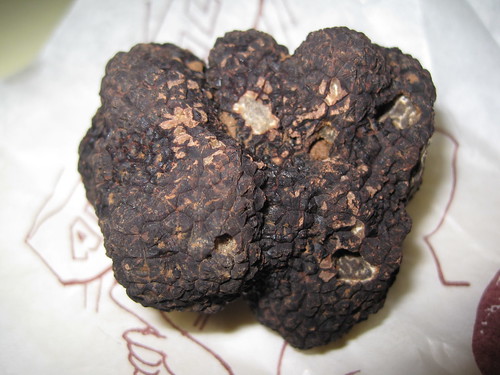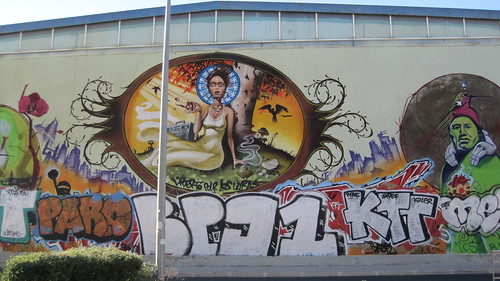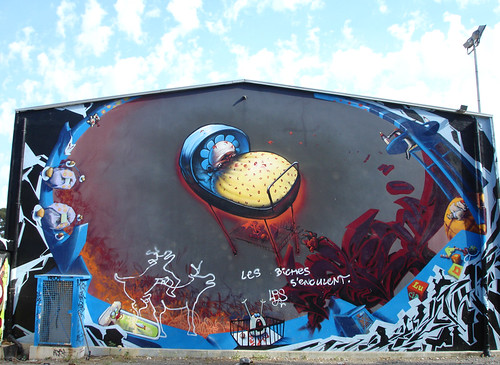Ed Parsons has been beating the drum for open climate data. I like open
data, but it's not not without its own problems. A potential problem for
science, and scientific consensus, in a brave new world where we are all now
climate scientists, is the ramping up of the social denial of service attacks
identified by Steve Easterbrook:
But in reality, the denialists don’t care about the science at all; their aim
is a PR campaign to sow doubt in the minds of the general public. In the
process, they effect a denial-of-service attack on the scientists – the
scientists can’t get on with doing their science because their time is taken
up responding to frivolous queries (and criticisms) about specific features
of the data. And their failure to respond to each and every such query will
be trumpeted as an admission that an alleged error is indeed an error. In
such an environment, is it perfectly rational not to release data and code –
it’s better to pull up the drawbridge and get on with the drudgery of real
science in private. That way the only attacks are complaints about lack of
openness. Such complaints are bothersome, but much better than the
alternative.
In this case, because the science is vitally important for all of us, it’s
actually in the public interest that climate scientists be allowed to
withhold their data. Which is really a tragic state of affairs. The forces of
anti-science have a lot to answer for.
Joe Gregorio has this social denial of service thing nailed:
Let's go back to electronic denial-of-service attacks. They worked because of
an inherent asymmetry between the attacker and the attacked. [i.e. from
earlier in Gregorio's post: The attacker performs very little computation to
send the packets, but the server has to accept them and perform some
computation to determine if they are valid or bogus. In this way an attacker
with the same or less computational power can overwhelm a bigger host.] The
same is true of the social denial-of-service attack where arguments,
responses, rebuttals and more importantly time has to be spent responding to
the bad faith objections, which are easily written up and tossed onto the
mailing list.
Denial of service on climate science was bad enough before the leaked emails,
now scientists have to read the emails, parse them, and explain how they don't
falsify the science in every public forum and every media outlet. Next, add to
the mix climate data and models. What happens when some blog or cable TV gasbag
complains that not only do the model results of scientists not match his
interpretation of the data, but that he couldn't even get the model to run on
his computer, no matter how hard he tried, and that the code itself might be
fraudulent. That's not going to be a victory for transparency.
Perhaps we need to match open climate data and models with a change in the
rules of our climate debate. Gregorio explains the rules used by the IETF:
Remember that one way to fight a denial of service attack is to raise the
amount of computation required by the attacker. In the case of a Working
Group the way to do that is by requiring disruptions to take more time and
energy. This is where the call for "camera ready copy in the form of a Pace"
comes from in the AtomPub WG. Camera ready copy is much more difficult to
write than a one or two line objection tossed into a mailing list. Only if
you are willing to put in the work to write up a Pace with reasonable text
will it start to take up the time of the WG. Your willingness to put in the
time and effort to create camera ready copy will distinguish your proposals
and objections from those of an attacker.
Similarly, in the climate debate, we could demand that denialists publish their
arguments and supporting evidence in peer-reviewed journals. (Note that I'm
distinguishing denialists from the skeptics who already do publish in
peer-reviewed journals.) Does it risk giving them unwarranted credibility?
Maybe, but I think that it's balanced by increased cost. Even low-cost
electronic journals completely stacked with friendly reviewers will help level
the asymmetry that makes a DOS attack possible. Forcing the denialists to read
and personally sign off on the work of others, or even just keeping them
occupied correcting each other's grammar and spelling, would be a good start.
We could demand this, and by "we" I mostly mean our media, but that would
require our media to transform itself into something that infotains us a little
less and edifies us a little more, and that's probably too much to ask, yeah?
I don't have an answer, but it's interesting to look at some aspects of the
climate debate as a denial of service attack, and I didn't see that
perspective come up in any of the many comments on Ed's blog. I also recommend
Bryan Lawrence's post on this topic. He doesn't use the word "attack", but
certainly expresses some frustration at the extra load put on climate
scientists in these times.










